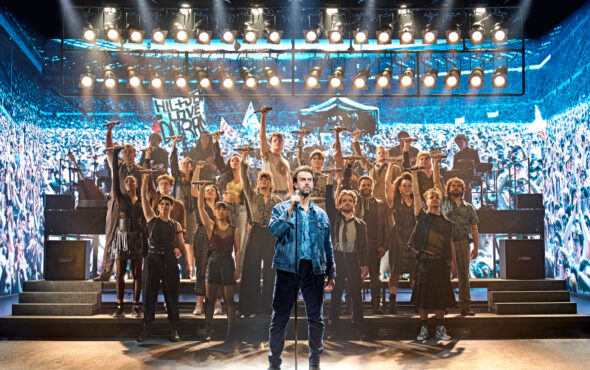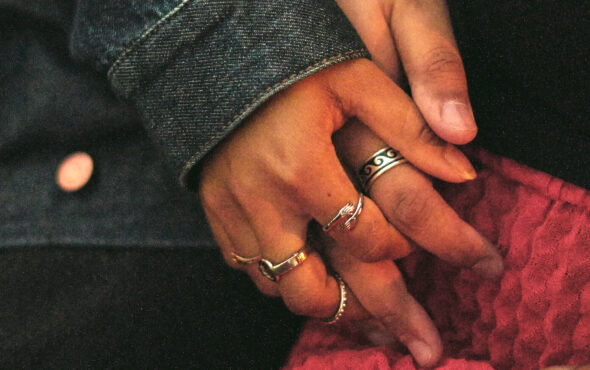
Just For One Day, the new jukebox musical with book by John O’Farrell, tells the story of the huge Live Aid concerts held simultaneously in the UK and the US on 13th July 1985, and the surrounding events. It’s told from both a 1980s and a present-day perspective; we meet Suzanne, who attended the Wembley concert, in both 2024 (played by Jackie Clune) and in 1985 (Hope Kenna) – she decides to take a trip down memory lane after meeting Jemma (Naomi Katiyo), who wants to understand what lessons can be learned today from those charitable endeavours.
Over the course of the show we meet plenty of the key players who made it all happen, including organiser and Boomtown Rats frontman Bob Geldof (Craige Els) alongside co-writer of the Band Aid single Midge Ure (Jack Shalloo), as well as plenty of recognisable figures from the era including Margaret Thatcher (Julie Atherton, who is excellent). We also have occasional insights into events on the ground in Ethiopia via aid worker Amara (Abiona Omonua).
We’ll start with the positives: it all looks and sounds fantastic. The Old Vic feels like it’s been transformed into a rock concert, with a suitably impressive lighting and sound rig, and the band is excellent. The quality of the singing is superb throughout, and the song selection is just banger after banger, with the biggest hits from the stars who played the concerts, including the likes of Queen, David Bowie and Elton John. It’s an evening tinged with nostalgia, and with music like this it all fells very celebratory and uplifting.
And yet… the book lets Just For One Day down somewhat. It’s absolutely full of cliches, and some of the characters just aren’t particularly well-written – there are some, including technicians working on the concert or record label executives, who are afforded a lot of airtime and yet are quite noticeably underdeveloped.
The tone of the musical seems a bit off, too – it’s all very celebratory and self-congratulatory, which seems jarring given history has taught us that Live Aid actually changed very little in the long run. Yes it helped get some aid into Ethiopia, briefly, but it didn’t achieve sustained change. This is acknowledged – in fact a few good points are made, noting that the concerts were dominated by white men, or that these events unhelpfully painted a picture of Africa as one homogeneous continent instead of very distinct countries – but these points are made infrequently and fleetingly.
The main focus of the show is on the work of Bob and his team, how much money they raised and how generous all these musicians were with their time – it results in a bit of a ‘white saviour’ narrative which sits a bit uncomfortably. A late show proclamation about the success of Live Aid – “it worked!” – feels a bit tone deaf, given we know that very little actually changed as a result. It’s a shame – if we were judging Just For One Day on the music alone, it would be fantastic; but the story it tells has its fair share of issues.
GAY TIMES gives Just For One Day – 3/5
More information can be found here.



